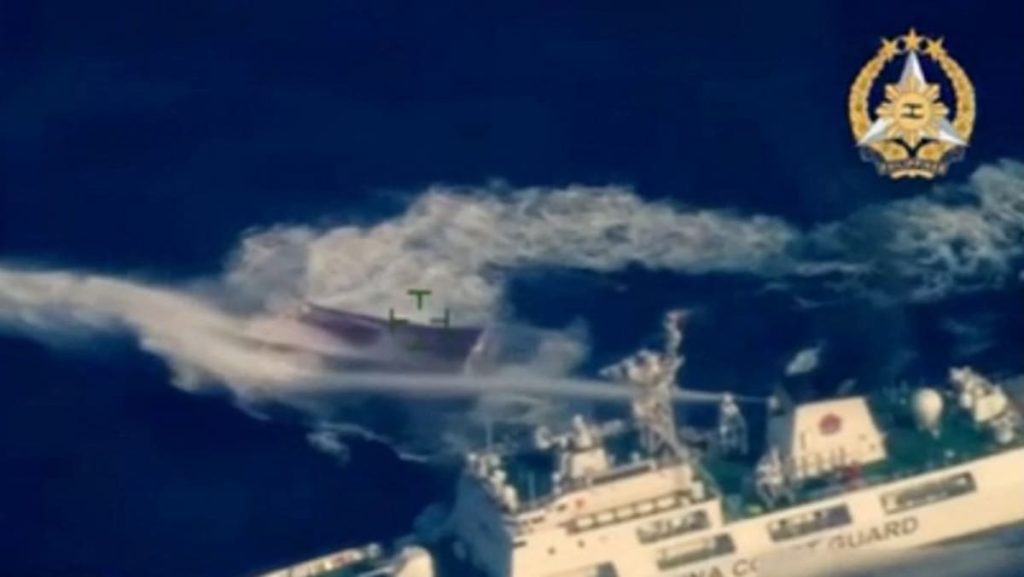authorities said on Thursday, in a renewed warning to Beijing against territorial aggression. The incident marked the second time in just over a week that the Chinese coast guard had aggressively confronted Philippine vessels delivering food, water, and other supplies to Philippine troops stationed on Second Thomas Shoal, a disputed reef in the Spratly Islands. The Philippines lodged a diplomatic protest with China over the incident, which the defense secretary described as an “act of aggression.” The latest incident comes amid heightened tensions in the South China Sea, where several countries have overlapping maritime claims, and China has been increasingly assertive in asserting its territorial claims.
The Philippines has long been embroiled in territorial disputes with China over parts of the South China Sea, particularly the Spratly Islands. The Second Thomas Shoal, also known as Ayungin Shoal, is a strategic outpost for the Philippines, located approximately 105 nautical miles from Palawan. The reef is home to a small contingent of Philippine troops stationed on a dilapidated ship, the BRP Sierra Madre, which serves as a symbol of Philippine sovereignty in the disputed waters. China has asserted its claim over the reef and the surrounding waters, leading to frequent confrontations between Chinese and Filipino vessels in the area.
The incident involving the Chinese coast guard’s water cannon attack on a Filipino supply vessel near Second Thomas Shoal has once again raised concerns about China’s aggressive actions in the disputed waters of the South China Sea. This latest incident comes just over a week after a similar incident in which the Chinese coast guard blocked and used water cannon against two Philippine supply boats en route to the reef. The Philippines has been vocal in protesting China’s actions, with officials describing the incidents as “harassment” and “an act of aggression.” The latest confrontation highlights the ongoing tensions in the region and the challenges faced by smaller countries like the Philippines in dealing with a more powerful and assertive China.
In response to the latest incident, the Philippines has summoned Chinese Ambassador Huang Xilian to lodge a diplomatic protest over the water cannon attack on its supply vessel near Second Thomas Shoal. The Philippines has also raised the issue with the Association of Southeast Asian Nations (ASEAN), of which both China and the Philippines are members. The Philippine government has called on China to respect international law and the principles of good neighborliness, expressing its commitment to peacefully resolve disputes in the South China Sea through dialogue and in accordance with international law. The Philippines has reiterated its appeal to all parties involved in the territorial disputes to exercise restraint and refrain from actions that could escalate tensions in the region.
The latest incident near Second Thomas Shoal has once again highlighted the complex and contentious nature of the territorial disputes in the South China Sea, where multiple countries have competing claims over various islands, reefs, and waters. China’s assertive actions in asserting its claims in the region have raised concerns among its neighbors and other countries with stakes in the South China Sea. The Philippines, as a claimant state in the disputes, has been at the forefront of efforts to address the escalating tensions in the region and push for a peaceful resolution to the disputes. The recent incidents involving the Chinese coast guard’s aggressive actions have underscored the challenges faced by countries like the Philippines in defending their territorial sovereignty against a more powerful and assertive neighbor.
The ongoing tensions in the South China Sea have far-reaching implications not only for the countries directly involved in the disputes but also for regional stability and security. The disputes have drawn international attention and concern, with various countries, including the United States, expressing support for freedom of navigation and peaceful resolution of the disputes in accordance with international law. The incidents involving the Chinese coast guard’s water cannon attacks on Philippine vessels near Second Thomas Shoal have once again underscored the need for all parties involved to exercise restraint, respect international law, and work towards de-escalating tensions in the region. As the situation in the South China Sea continues to evolve, the international community will be closely watching developments and urging all parties to uphold the principles of peace, stability, and cooperation in the region.


